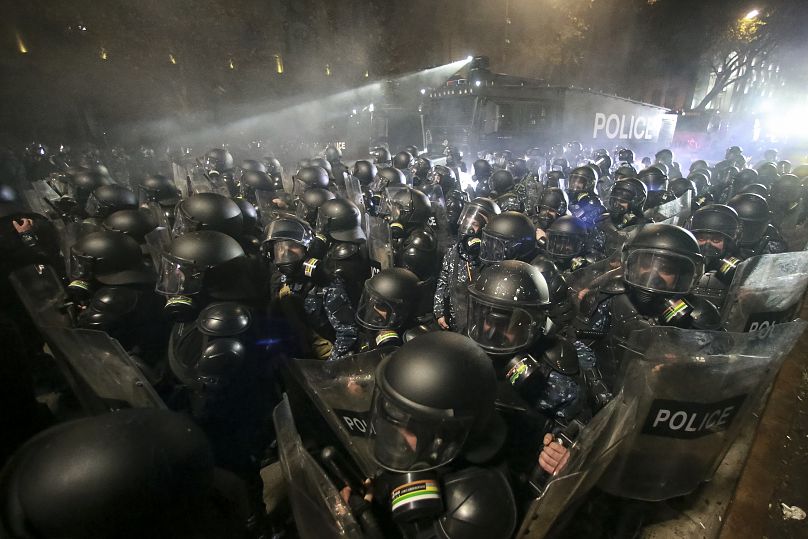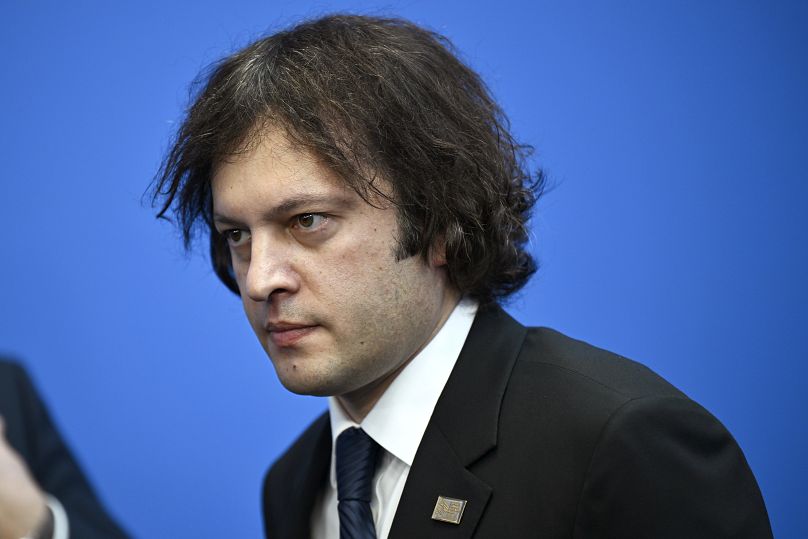Protesters again swarmed the parliament, with some trying to break through its gates, in anger over the government's back-tracking on EU negotiations.
Thousands of people have protested for a second night against the Georgian government's decision to suspend European Union accession negotiations.
Protesters again swarmed the parliament in the capital Tbilisi, with some trying to break the metal gates to the building.
Riot police used water cannons to push them away from the building and later moved to force them farther back along the Rustaveli Avenue, the city's main boulevard.
Some of the protesters used rubbish bins and benches to try to build barricades, whilst the police fired tear gas and pepper spray at them.
That elicited an angry response from the country’s pro-EU president Salome Zourabichvilli, who has long been at odds with the pro-Russia Georgian Dream party.
"Once again, we witness brutal and disproportionate attacks on the Georgian people and media, reminiscent of Russian-style repression," she said in a post on X.
The increasingly brutal police response was also commented on by a member of the opposition Droa party.
"Now people, are dragged out of buildings where they are sheltering, out of pharmacies, and so on, as well. So, if we had any sense of security during previous protests, now we do not have from this morning, we do not have any sense of security," Marika Mikiashvili told Euronews.
Clashes between police and protesters also erupted late on Friday night in the Black Sea port city of Batumi.
"We are not only fighting against Georgian Dream; we are fighting against Russia, we are fighting against Russian influence in this country. An enormous amount of resources, money, and everything is now being enacted. That is why I do ask all leaders of the democratic world to support the Georgian people. Sanctions, actions, funding, everything needs to be done. That's very important," said Giorgi Vashadze, the leader of Unity National Movement Coalition.
Disputed election win
The Georgian Dream's disputed victory in the 26 October parliamentary elections, which was widely seen as a referendum the country’s aspirations to join the EU, sparked massive demonstrations and led to an opposition boycott of parliament.
The opposition said the vote was rigged under the influence of Russia which is seeking to keep Georgia in its orbit.
The government's announcement that it was suspending negotiations to join the EU came hours after the European Parliament adopted a resolution that condemned last month’s vote as neither free nor fair, representing yet another manifestation of the continued democratic backsliding "for which the ruling Georgian Dream party is fully responsible."
European election observers said October's vote took place in a divisive atmosphere marked by instances of bribery, double voting and physical violence.
The EU granted Georgia candidate status in December 2023 on condition that it meet the bloc's recommendations, but put its accession on hold and cut financial support earlier this year after the passage of a "foreign influence" law widely seen as a blow to democratic freedoms.
EU lawmakers urged a rerun of the parliamentary vote within a year under thorough international supervision and by an independent election administration.
They also called on the EU to impose sanctions and limit formal contacts with the Georgian government.
The Georgian prime minister fired back, denouncing what he described as a "cascade of insults" from the EU politicians and declaring that "the ill-wishers of our country have turned the European Parliament into a blunt weapon of blackmail against Georgia, which is a great disgrace for the European Union."
“We will continue on our path toward the European Union; however, we will not allow anyone to keep us in a constant state of blackmail and manipulation, which is utterly disrespectful to our country and society,” Irakli Kobakhidze said.
Kobakhidze also said Georgia would reject any budgetary grants from the EU until the end of 2028.
Critics have accused Georgian Dream — established by Bidzina Ivanishvili, a shadowy billionaire who made his fortune in Russia — of becoming increasingly authoritarian and tilted toward Moscow.
The party recently pushed through laws similar to those used by the Kremlin to crack down on freedom of speech and LGBTQ+ rights.













